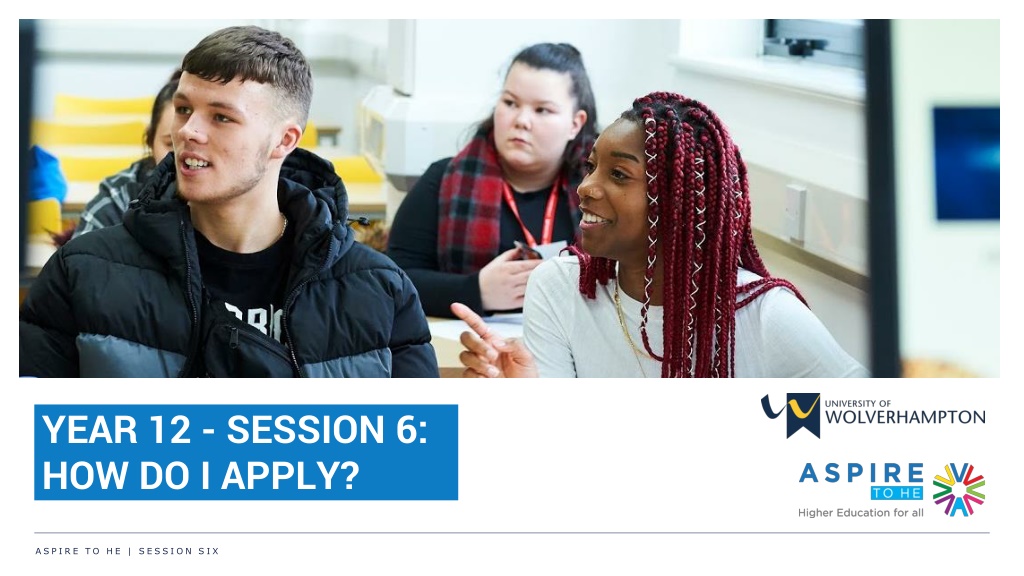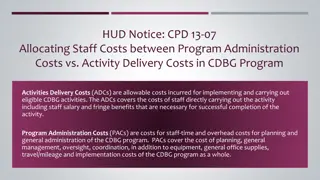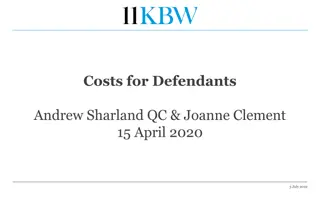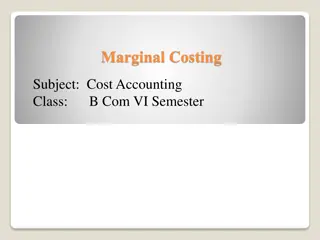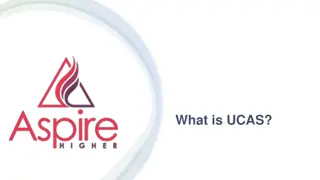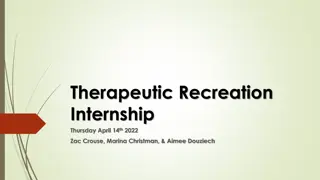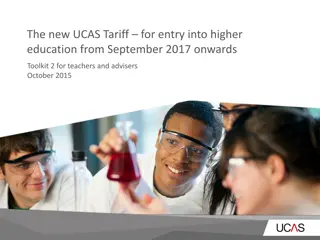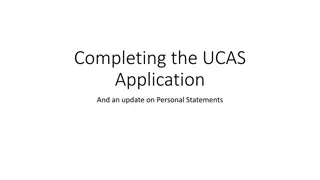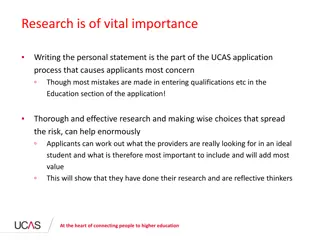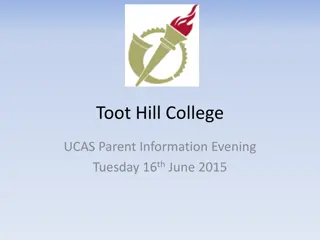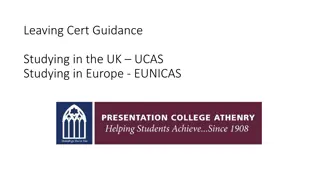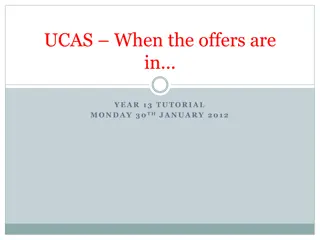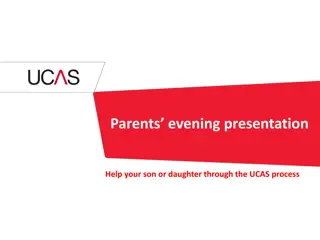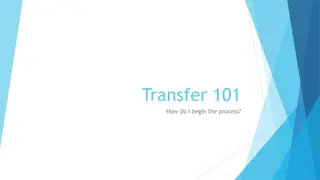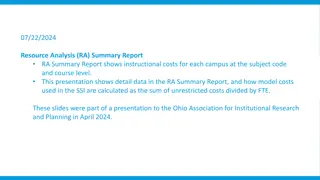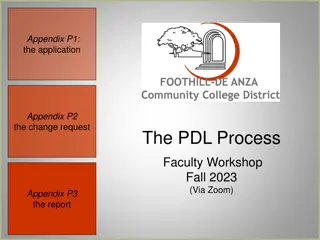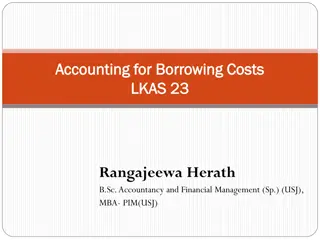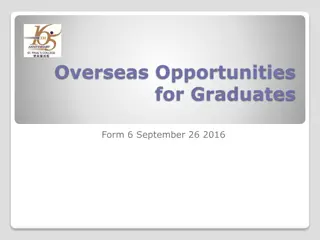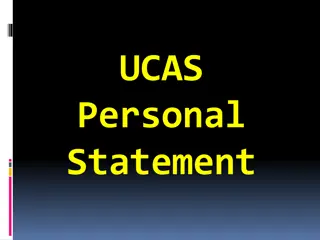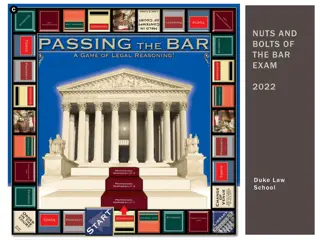Understanding UCAS: Application Process, Costs, and Deadlines
In this session, you will delve into the intricacies of applying to university through UCAS. Explore the financial support options available, decipher the importance of personal statements, and grasp the significance of key deadlines like the 15th of October. Gain insights into UCAS's role, application costs for 2021 entry, and more to enhance your university application journey.
Download Presentation

Please find below an Image/Link to download the presentation.
The content on the website is provided AS IS for your information and personal use only. It may not be sold, licensed, or shared on other websites without obtaining consent from the author. Download presentation by click this link. If you encounter any issues during the download, it is possible that the publisher has removed the file from their server.
E N D
Presentation Transcript
YEAR 12 - SESSION 6: HOW DO I APPLY? A S P I R E T O H E | S E S S I O N S I X
PREVIOUS SESSIONS OBJECTIVES OBJECTIVE 1: To understand the financial support available through Student Finance and the government. OBJECTIVE 2: To understand the financial support available through scholarships and grants. OBJECTIVE 3: To understand the main costs associated with higher education and university.
CHECK IN See if the universities you re interested in offer scholarships or bursaries What did you find?
SESSION OBJECTIVES OBJECTIVE 1: To understand what UCAS is and key information about applying for university. OBJECTIVE 2: To understand university rankings and how to make use of Open Days. OBJECTIVE 3: To understand what a personal statement is and how important it is to your application.
WHAT IS UCAS? QUIZ
WHAT IS UCAS? UCAS stands for Universities and Colleges Admissions Service . It s the centralised service that students use to apply to university. UCAS does: process applications provide information, advice, and training have a Fraud and Verification Team take part in education sector engagement UCAS doesn t: suggest courses or universities make decisions or offers advise on finance, immigration, or visas for individuals
HOW MANY UNIVERSITIES CAN STUDENTS APPLY TO? A. 1 B. 3 C. 5 D. 7 Answer = 5 Students will have the opportunity to apply for up to 5 choices.
HOW MUCH WILL IT COST TO APPLY FOR COURSES VIA UCAS FOR 2021 ENTRY? A. 18 for a single choice, 23 for more than one choice. 20 for a single choice, 30 for more than one choice. 23 for a single choice, 25 for more than one choice. 20 for a single choice, or 26 for more than one choice. B. C. D.
WHAT IS SIGNIFICANT ABOUT THE DATE 15TH OCTOBER? Answer: It s the deadline for UCAS applications to most medicine, dentistry, veterinary medicine/science courses, as well as all courses at the universities of Oxford and Cambridge. A. It s the deadline to apply for medicine, dentistry and Oxford and Cambridge. It s when you should start your UCAS application. It s a bank holiday. It s not significant. B. C. D.
HOW MANY APPLICANTS PLAGIARISED IN THEIR PERSONAL STATEMENT IN 2018? A. 1,500 B. 4,559 C. 5,604 D. 2,589
THE COURSE STUDENTS CHOOSE TO STUDY NEEDS TO BE VITAL TO THEIR FUTURE CAREER A. TRUE B. FALSE Answer = False In most cases the answer is false. HE courses enable students to gain transferable skills. These skills can be taken to many different careers and job roles. However, some careers will require a particular degree course. E.g. if you want to be a Pharmacist you will need to study Pharmacy.
WHAT IS SIGNIFICANT ABOUT THE DATE 15TH JANUARY? A. It s the deadline to hand in your UCAS application. It s when you should start your UCAS application. It s in the third week of the new year. It s not significant. B. C. D.
HOW MANY UNIVERSITY DECISIONS ARE THERE? A. 2 B. 5 C. 3 D. 4 Answer = 4 Conditional Offer Unconditional Offer Unsuccessful Withdrawal Conditional, Unconditional Conditional, Unconditional, Withdrawal, Successful, Unsuccessful Conditional, Unconditional, Withdrawal Conditional, Unconditional, Withdrawal, Unsuccessful
WHAT IS EXTRA? A. It s where you put extra information on your UCAS application. Extra allows you to add another university choice if you have used all five of your choices on your original application and you re not holding an offer. Extra is a service that helps you fill out your application. It s for people that want to receive more information about the universities they have applied to. B. C. D.
WHAT IS ADJUSTMENT? A. B. C. It s when you lie about your results. It s how you accept or reject offers. It s where you can change your personal statement. Adjustment is a chance for students to potentially change their university course if they ve met and exceeded conditions for their firm choice. D.
WHAT IS CLEARING? A. B. It s when you delete your UCAS application. It s an opportunity for applicants without an offer to find a university place. It s a second chance for those who didn't want to accept the offer(s) they held originally. A way for universities to fill any spaces they have left for the new academic year. C. D.
WHAT IS CLEARING? Answer Clearing is An opportunity for applicants without an offer to find a university place. A second chance for those who didn't want to accept the offer(s) they held originally. A way for universities to fill any spaces they have left for the new academic year. Clearing is for if You haven t already applied for a university course this year. You haven t received any offers. You haven t met the conditions of any of your offers. You've changed your mind.
Universities consider application Apply Register with UCAS online using UCAS This is done by logging on to www.ucas.com Make firm/ insurance Choice No offers? UCAS Extra University offers/rejections Clearing Exam Results DON T GO ON HOLIDAY FOR RESULTS DAY!!!!! Confirmation Adjustment
YOUR TURN! Now we ve explored more about UCAS, it s your turn! Set up an account on UCAS Hub to find out more about applying to university, student life, financial support and more!
UNIVERSITY LEAGUE TABLES University rankings and league tables offer you an insight into what each University is good and bad at. They include factors such as student satisfaction, student:staff ratio, graduate prospects and entry grades. League tables contain a lot of information and are often quite closely ranked, with only a few points separating one ranked 40 and another ranked 50. With there not being much overall difference between some Universities, it could be worth looking at which of the factors are most important to you. Overall rankings may be very different from specific subject rankings. A University for your chosen course could be ranked near the bottom overall, but near the top for a specific course it s important to check this!
WHERE CAN I FIND THEM? There are a few different University league tables out there, and some put more importance on some factors than others. For example, The Guardian league table favours Universities that students have rated as being good at teaching and assessment, as well as those who are good at helping students who aren t typically high- achievers. However, The Guardian doesn t include research quality or academic reputation, so top-ranking Universities included in their league table may not have the most influential lecturers in the institution. You can find the most used league tables here: The Times QS World University Rankings Complete University Guide The Guardian
RUSSELL GROUP UNIVERSITIES The Russell Group University website states that The Russell Group s 24 members are world-class, research-intensive universities. They are unique institutions, each with their own history and ethos, but they share some distinguishing characteristics . Russell Group Universities produce more than two-thirds of the world-leading research produced in UK universities and support more than 300,000 jobs across the country . Russell Group Universities economic output is more than 32 billion every year.
RUSSELL GROUP UNIVERSITIES Russell Group Universities are often called University of major cities, some examples include: University of Birmingham University of Newcastle King s College London London School of Economics University of Nottingham Cardiff University Queen Mary University of London University of Liverpool University of Warwick Imperial College London University of Manchester
UNIVERSITY RANKINGS Are Russell Group Universities best ? Below are top 10 universities according to one league table: 3 of the top 10 universities overall are non-Russell Group. How does that compare for different subjects?
HOW MANY RUSSELL GROUP Out of the top 17 universities for accounting and finance, how many are Russell Group? UNIS? Only 6 out of the top 17 universities for accounting and finance are Russell Group universities
HOW MANY RUSSELL GROUP UNIS? Out of the top 17 universities for art, how many are Russell Group? Only 3 out of the top 17 universities for art are Russell Group universities
HOW MANY RUSSELL GROUP Out of the top 17 universities for education, how many are Russell Group? UNIS? Only 3 out of the top 17 universities for education are Russell Group universities
WHATS IMPORTANT TO YOU? There are many factors that are taken into consideration when ranking universities. What are the most important factors for you? Rank the following in order of personal importance remember, there is no wrong answer! 9 Write each of the following on one of the diamonds on the resource sheet and rank them in order of importance to you: Student satisfaction of course Student satisfaction of teaching Student satisfaction of feedback Student to staff ratio Spend per student Graduate/career prospects Cost of living Entry tariffs Spending on facilities
OPEN DAYS AND PROSPECTUSES - Where can I find out about open days? - What is available to me on an open day? - How can I make the most of open days? - What does a prospectus contain? - How do I order one?
OPEN DAYS Open days are a tremendously useful opportunity to explore the universities you are interested in first-hand. They are frequently advertised on university websites and on billboards: also check out opendays.com for a full calendar across the UK. Visits are best to arrange yourself you can decide how you want your experience to look. Do not wait for someone else to make the first move your mates or your school! Have a look at this virtual open day as a taster for what to expect: https://www.youtube.com/watch?v=NtE1Omjx73U.
REFLECTION What can you do on an open day?
DOS AND DONTS Collaborate to think of some dos and don ts for open days DOS DON TS
DOS AND DONTS Dos Visit the local area Try and have a look around the university yourself Take photos to remind you of your favourite things Speak to student ambassadors Ask yourself: would I be happy here? Don ts Arrive unprepared what do you want to get out of it? Be late you don t want to miss anything Leave wishing you had asked a question Leave early / before seeing everything
PROSPECTUSES These are complete guides to a given university presented in a catalogue-style format. They are highly useful resources which contain a wealth of information about the university, including details of courses available. They are easy to order from university websites, and your school library is likely to have a stash if your sixth-form common room does not!
UCAS APPLICATIONS HOW MANY PEOPLE APPLIED TO UNIVERSITY THROUGH UCAS IN 2019? 550,000 A. 50,000 B. 250,000 C. 550,000
PERSONAL STATEMENT - Key part of your UCAS application! - Chance to stand out from the crowd! - Opportunity to tell university course tutors (admissions tutors) why you want a place on their course. - Showcase how your skills, experience, passion and aspirations are suited to the course.
UCAS PERSONAL STATEMENT TOP TIPS https://www.youtube.com/watch?v=_8hFkMAjW-I
THINGS TO BE DOING NOW ABC activity: what skills have you developed and how can you apply them to a university course? Gain experience and skills to include on your personal statement: o volunteering, part-time work, watch online lectures, read online journals. Come and see me for a Personal Statement workshop or mentoring session! Make a start! Do a first draft you can always make improvements!
ENDPOINT SURVEY To help Aspire to HE record our progress, we need you to complete a short 15-minute survey! Go to the link for your year group and complete the questionnaire. I m here to help if you need it!
INDEPENDENT ACTIVITY USE THE PERSONAL STATEMENT WORKSHEET TO START THINKING ABOUT WHAT MIGHT GO IN YOUR PERSONAL STATEMENT
